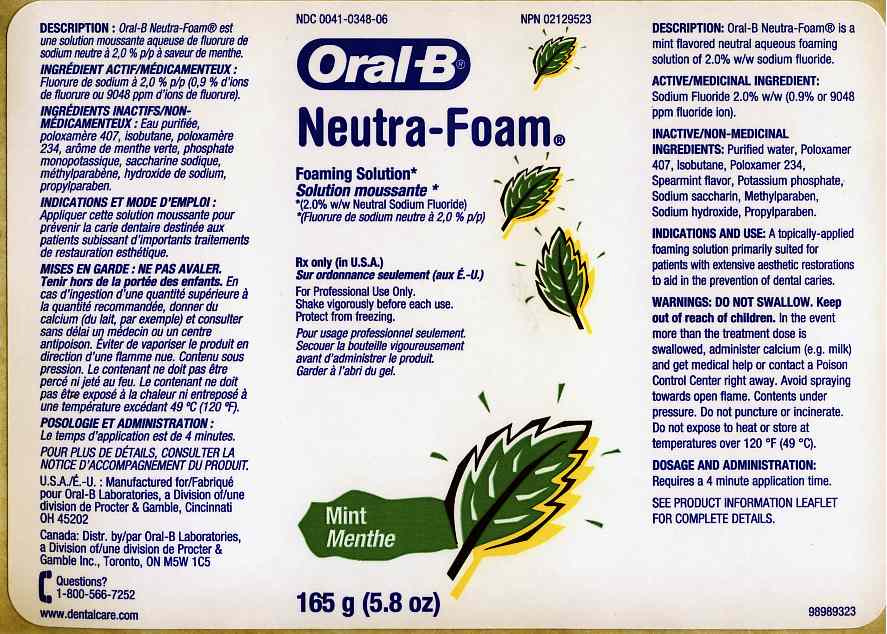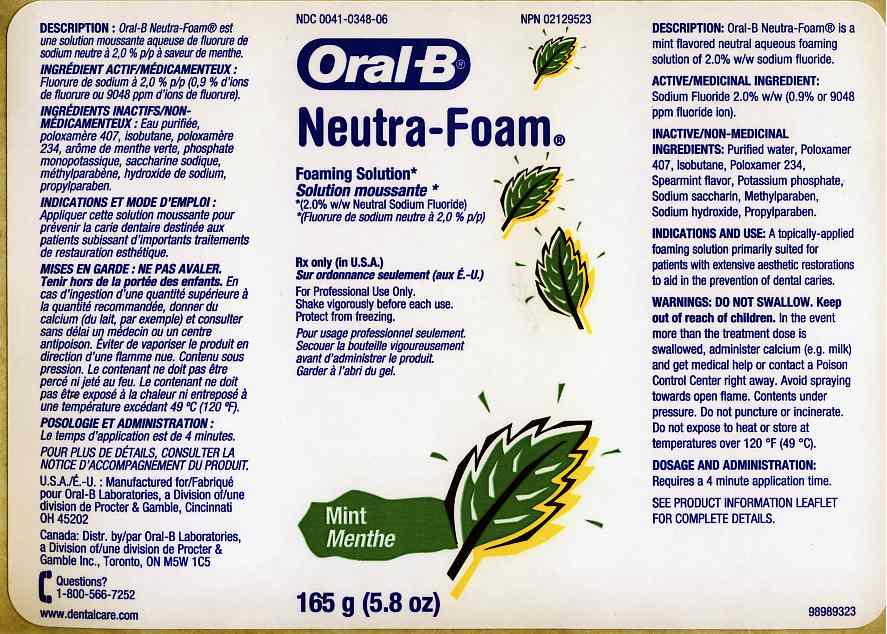Label: ORAL-B NEUTRA-FOAM MINT- neutral sodium fluoride aerosol
-
Contains inactivated NDC Code(s)
NDC Code(s): 0041-0348-06 - Packager: Oral-B Laboratories
- Category: HUMAN PRESCRIPTION DRUG LABEL
- DEA Schedule: None
- Marketing Status: unapproved drug other
DISCLAIMER: This drug has not been found by FDA to be safe and effective, and this labeling has not been approved by FDA. For further information about unapproved drugs, click here.
Drug Label Information
Updated October 1, 2010
If you are a consumer or patient please visit this version.
- Download DRUG LABEL INFO: PDF XML
- Official Label (Printer Friendly)
- PATIENT PACKAGE INSERT
- DESCRIPTION
- INACTIVE INGREDIENT
- CLINICAL PHARMACOLOGY
- INDICATIONS & USAGE
- CONTRAINDICATIONS
-
WARNINGS AND PRECAUTIONS
WARNINGS: DO NOT SWALLOW.
• Accidental ingestion of the usual treatment dose (approximately 9.0 mg of fluoride) is not harmful. In the event more than the treatment dose is swallowed, administer calcium (e.g. milk) and get medical or contact a Poison control Center right away. One bottle of Neutra-Foam contains 1.43 grams of fluoride ion which could be lethal for children and adults.
• Keep out of the reach of infants and children under 12 years.
• Pediatric patients under 12 years of age should be supervised during use of this product.
• Avoid spraying towards open flame.
• Contents under pressure. Do not puncture or incinerate. Do not expose to heat or store at temperatures over 120°F (49°C).
PRECAUTIONS: FOR PROFESSIONAL USE ONLY.
Safety and effectiveness below age 6 have not been established. There have been no long term studies with this product to evaluate carcinogenic, mutagenic or impairment of fertility potential.
-
CARCINOGENESIS & MUTAGENESIS & IMPAIRMENT OF FERTILITY
Carcinogenesis, Mutagenesis, Impairment of Fertility:
Fluoride ion is not mutagenic in standard bacterial systems but has been associated with genetic aberrations in cultured human cells at doses much higher than expected for human exposure (6,8). Some in vivo studies report chromosomal aberrations in rodents while other studies using similar protocols report negative results (7).
No evidence of carcinogenicity was observed in female and male mice at doses ranging from 2.4 to 18.8 mg/kg sodium fluoride of body weight (3,4). Equivocal evidence of carcinogenicity was reported in male rats at doses ranging from 2.5 to 4.1 mg/kg fluoride, but no evidence of carcinogenicity was observed in female rats (3,4). In another study, no carcinogenicity was observed in rats treated with fluoride up to 25 mg/kg of body weight (5). Overall, epidemiological studies do not show an association between fluoridated drinking water and increased cancer risk in humans (7).
Potential adverse reproductive effects of fluoride exposure in humans have not been adequately evaluated. Adverse reproductive effects of fluoride have been reported in animal studies, but at high concentrations sufficient to produce other manifestations of toxicity (9).
-
PREGNANCY
Pregnancy:Teratogenic Effects: Pregnancy Category B. Fluoride readily crosses the placenta (7,9). Animal studies (rats and rabbits) have shown that fluoride is not a teratogen (10,12,13). Maternal exposure to 18 mg Fluoride/kg of body weight did not affect maternal body weight, litter size or fetal weight and did not increase frequency of skeletal or visceral malformations (10). There are no adequate and well-controlled studies in pregnant women. Several epidemiological studies show no increase in birth defects in areas with fluoridated water compared to areas with low fluoridated water (7). However, caution should be exercised when fluoride is administered to pregnant women.
-
NURSING MOTHERS
Nursing mothers: Due to the relative insensitivity of human milk fluoride levels to changes in maternal fluoride intake, and due to the very low concentrations of fluoride in human milk, fluoride supplementation during lactation would not be expected to significantly affect fluoride intake by the nursing infant (11). However, caution should be exercised when fluoride is administered to nursing women.
-
PEDIATRIC USE
Pediatric use: The use of fluoride solutions, gels, and foams containing up to 1.23 % fluoride ion as caries preventives in pediatric patients aged 6 to 16 years is supported by clinical studies in students aged 6 to 12 years (1,2). Safety and effectiveness in pediatric patients below the age of 6 years has not been established. Please refer to CONTRAINDICATIONS and WARNINGS sections.
-
GERIATRIC USE
Geriatric use: No overall differences in safety or effectiveness have been observed between geriatric and younger patients. This drug is known to be substantially excreted by the kidney, therefore the risk of toxic reactions to this drug may be greater in patients with impaired renal function. Because elderly patients are more likely to have decreased renal function, care should be taken in dose selection, and it may be useful to monitor renal function.
-
ADVERSE REACTIONS
ADVERSE REACTIONS: Developing teeth of children under age 6 may become permanently discolored if excessive amounts are repeatedly swallowed. The following adverse reactions are possible in individuals hypersensitive to fluoride: eczema, atopic dermatitis, urticaria, gastric distress, headache and weakness. In patients with mucositis, gingival tissues may be hypersensitive to the flavor.
-
OVERDOSAGE
OVERDOSAGE: Accidental ingestion of large amounts of fluoride can result in acute irritation of the mouth and gastrointestinal tract as well as the development of gastrointestinal symptoms such as nausea, vomiting, diarrhea, hematemesis epigastric cramping and abdominal pain. If a large amount of fluoride equal to or greater than 5 mg fluoride/kg body weight (2.3 mg fluoride/lb body weight) is ingested, give calcium (e.g. milk, 5% calcium gluconate or calcium solution) orally to relieve gastrointestinal symptoms and admit immediately to a hospital facility. A standard treatment dose of Neutra-Foam contains approximately 9.0mg fluoride. One 165 g (5.8 oz) bottle contains approximately 1.43 g of fluoride.
-
DOSAGE & ADMINISTRATION
DOSAGE AND ADMINISTRATION: Adults and Children 6 years and over: Use foam 2 times a year. The initial time you dispense from a new bottle, gently lift upward on the nozzle to break the protective seal (thin plastic tab located adjacent to trigger). If this seal is broken do not use product. When breaking this seal, there could be an initial surge of foam from the dispenser.
• Shake bottle vigorously for 3-4 seconds prior to dispensing.
• Invert bottle 180° with nozzle tip pointed downward into tray.
• Place nozzle tip close to the tray floor and at one end of the tray arch.
Moving from one end of the tray to the other in one fluid motion, slowly press down on the trigger. (Note: foam will expand slightly to fill the tray.)
• Do not use excessive finger pressure which could result in too much foam being dispensed.
• Immediately place tray(s) in mouth. (Note: Do not fill trays with foam too far in advance of treatment as the foam will collapse and not be as effective.)
• Have patient bite down on the tray(s) lightly but firmly for up to 4 minutes.
• Remove tray(s) and have patient expectorate.
• Instruct patient not to eat, drink, or rinse for at least 30 minutes. For optimal tooth coverage, use a fluoride applicator tray which is deep enough to reach the entire vertical height of all teeth (even the molars). You can choose from single arch trays (such as CENTRAYS) or dual arch trays (CENTWINS or SOFTWINS).
- HOW SUPPLIED
-
REFERENCES
REFERENCES:
(1.) Wellock, W.D. and Brudevold, F.: Arch. Oral Biol., 10, 453-460 (1965) (2.) Jiang, H et al.: J. Dent, 33, 469-473 (2005) (3.) National Toxicology Program: NTP TR 393, NIH Publication 91-2842, (1990) (4.) Bucker, J.R. et al.: Int. J. Cancer 48, 733-737 (1991) (5.) Maurer, J.K. et al.: J. Natl. Cancer Inst. 82, 1118-1126 (1990) (6) Martin, G.R. et al.: Mutat. Res. 66, 159-167 (1979) (7.) Agency for Toxic Substances and Disease Registry: Toxicological Profile for Fluoride (2003)
(8.) Aardema, M.J. et al.: Mutat. Res. 331 (1), 171-172 (9.) National Research Council: Fluoride in Drinking Water (2006) (10.) Heindel, J.J. et al.: Fundam Appl Toxicol, 30, 162-177 (1996) (11.) Institute of Medicine, Food and Nutrition Board: Dietary Reference Intakes (1997) (12.) Collins, T.F. et al.: Food Chem. Toxicol. 33 (11), 951-960 (13.) Collins, T.F. et al.: Food Chem Toxicol. 39 (8), 867-876
- PRINCIPAL DISPLAY PANEL
-
INGREDIENTS AND APPEARANCE
ORAL-B NEUTRA-FOAM MINT
neutral sodium fluoride aerosolProduct Information Product Type HUMAN PRESCRIPTION DRUG Item Code (Source) NDC:0041-0348 Route of Administration DENTAL Active Ingredient/Active Moiety Ingredient Name Basis of Strength Strength Sodium Fluoride (UNII: 8ZYQ1474W7) (Fluoride ion - UNII:Q80VPU408O) Fluoride ion 9 mg in 1 g Product Characteristics Color Score Shape Size Flavor SPEARMINT (Spearmint flavor) Imprint Code Contains Packaging # Item Code Package Description Marketing Start Date Marketing End Date 1 NDC:0041-0348-06 165 g in 1 BOTTLE Marketing Information Marketing Category Application Number or Monograph Citation Marketing Start Date Marketing End Date unapproved drug other 05/04/2000 Labeler - Oral-B Laboratories (183102243)


